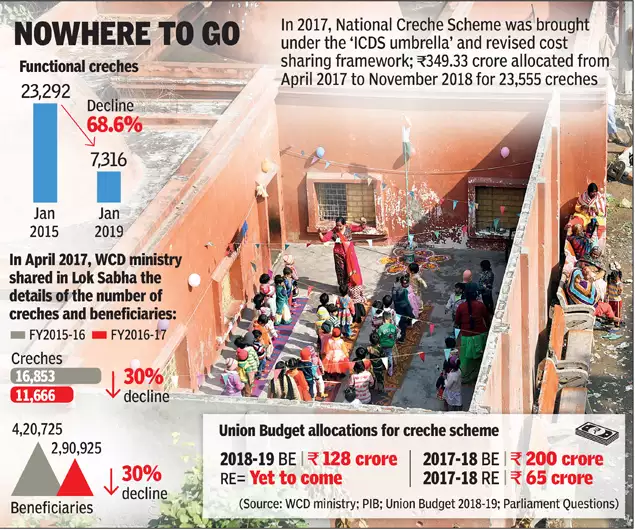
In News
Recently, the information on the National Creche Scheme has been provided by the Union Minister of Women and Child Development in the Lok Sabha today.
- A crèche is a facility which enables parents to leave their children while they are at work and where children are provided with a stimulating environment for their holistic development.
About the Scheme
- Launched in 2017, it is a centrally sponsored scheme implemented by the Ministry of Women and Child Development.
- Earlier, it was known as the Rajiv Gandhi National Creche Scheme.
- Aim: To provide daycare facilities to children (age group of 6 months to 6 years) of working mothers.
- It focuses on working women in rural and urban areas who are employed for a minimum period of 15 days in a month, or six months in a year.
- Need: The lack of proper day-care services is often a deterrent for women to go out and work. Therefore, such crèches were the urgent need for working women both in the organized and unorganized sectors.
- Coverage: The scheme has a pan India coverage with preferences for poor children and children with special nutritional needs.
- Integrated Package of Services under the Scheme
- Daycare facilities including sleeping facilities.
- Early stimulation for children below 3 years and pre-school education for 3 to 6 years old children.
- Supplementary nutrition (to be locally sourced).
- Growth monitoring.
- Health check-up and immunisation.
- Guidelines
- Crèches shall be open for 26 days in a month and for seven and a half hours per day.
- The number of children in the crèche should not be more than 25 per crèche with 1 worker and 1 helper. Of these, at least 40 percent of children should, preferably, be below 3 years of age.
- User Charges
- For BPL families: Rs. 20 per child per month.
- For families with income (both parents) of up to Rs. 12,000 per month: Rs. 100 per child per month.
- For families with income (both parents) of above Rs. 12,000 per month: Rs. 200 per child per month.
- Number of Beneficiaries: As of March 2020, 6453 creches are functional across the country.
- Assessment and Monitoring: Regular and strict monitoring is conducted at different levels to ensure effective running of the Scheme and also that the beneficiaries are delivered services.
- In order to assess the demand for crèches, the concerned States/UTs undertake survey-based analysis along with mapping of existing crèches.
- Monitoring of implementation is done through meetings and video conferences with the officials of State Governments/UT.
- Ministry officials undertake field visits to ascertain the status of implementation of the scheme.
- NITI Aayog conducts the third party evaluation.
|
(Image Courtesy: TOI) |
|
Other Related Steps Taken by Government
|
Previous article
National Industrial Corridor Programme
Next article
National Rail Plan
